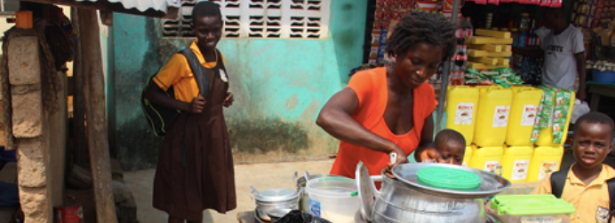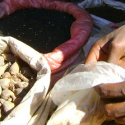Inclusive agribusiness and food security. Suggestions to increase the positive impact of your business

One in four people in Sub Saharan Africa is undernourished, making food security a daily struggle for millions of people.
Introduction
Foreign Direct Investments (FDI) are perceived to be of great importance in stimulating development and improving local food security. Inclusive business is proposed as the way to go. However, companies are struggling to set up such an inclusive business strategy. This summary, based on two master theses research in the context of the GCP project “Follow the Food”, provides insight in how FDIs in Sub Saharan Africa can foster inclusive and sustainable local development and as such contribute to food security for smallholder farmers.
Please download the master theses (PDF):
- “Achieving food security amongst Ghanaian smallholder farmers: The valuable role of inclusive agribusiness.” by Klaske de Vries
- “Corporate sustainability and food security – The impact of Foreign Direct Investments on the livelihoods of smallholder farmers in Ghana.” by Ine ter Berg
What is inclusive business?
Inclusive business is generally understood as doing business that benefits the poor through commercially interesting core operations (Donor Committee for Enterprise Development 2014). More specifically inclusive business refers to business practices that engage the poor in the entire supply chain or value chain. FAO (2014) defined the following principles for an inclusive business model: It provides a living wage for vulnerable groups, such as smallholder groups, small enterprises, women- and youth-run enterprises, while also enabling buyers to profit; it uses flexible trading arrangements that make it easier for smallholders or MSEs to supply a buyer, such as cash on delivery, accepting small consignments, providing reliable and regular orders; it supports farmers and small enterprises to establish a stronger negotiation position through skills development, collective bargaining and access to market information and financial services; it builds on the skills and expertise of existing market players, including traders and processors, and promotes value chain collaboration, transparency in pricing mechanisms, and risk sharing; it is scalable in the medium-term so that the numbers of small actors involved can be increased and/or the type of business model can be replicated in other value chains or parts of the sector; it allows for diversified income streams in the long term to enable the dissemination of upgraded skills to the rest of the sector, avoiding overdependence on any single buyer or market outlet.
A case study from Ghana
Ghana is an exemplary case of a developing country, where FDIs in agribusiness are of significant importance for the country’s economic development. While the World Bank has classified Ghana as a lower-middle income country, poverty and hunger remain important issues which are recurring topics on national policy agendas (FAO & FIVIMS 2009). In the period 2010-2012 1.4 million Ghanaians were found to be undernourished. Food insecurity numbers are highest in the northern regions, although rural smallholder farmers in southern Ghana are also prone to food insecurity because of inaccessibility to or impropriate food. Given the fact that many of the FDI’s in agribusiness are located in this area this is surprising. It is therefore interesting to better understand the link between FDIs and food security.
| Key figures on FDI in Ghana |
|
| Things you should know about food security in Ghana |
|
Case study HPW Fresh & Dry ltd.
This report is based on a case study of HPW Fresh & Dry ltd (HPW). HPW is a Swiss company that sells fresh and dried fruits such as mango, papaya, pineapple and coconut to retailers in Europe. Its cutting and drying facility is located in Adeiso; 50 kilometer North-West of Accra. The company started drying and exporting dried fruits in 2011 and currently produces up to 1200 ton of dried fruits and directly employs 760 people at their drying facility. HPW is the lead firm in the studied value chain and is supplied by around 300 smallholder farmers. HPW’s corporate sustainability vision is directly influenced by ideas of the triple bottom line and particularly focuses on the environment and employees. HPW’s corporate sustainability strategy regarding farmers is mainly reflected by its Fairtrade certificate and the corresponding arrangements. For this study a food security analysis was combined with a value chain- and a livelihood analysis. Data was collected through: desk research, structured interviews among 117 smallholder farmers, five focus groups, direct observations, semi structured interviews with specialists and stakeholders, informal conversations, and a survey among agribusinesses.
Challenges
Risk of income fluctuation
Farming makes up a significant part of the small holders’ household income. However livelihood diversification is required to feed the average of six household members. The research shows that, when taking in consideration only income from farming 15% of the farmers lives below the Ghanaian upper poverty line and 10% of the farmers lives below the Ghanaian lower poverty line.1 This number decreases to 2% of the farmers living below the upper Ghanaian poverty line and 0% living below the lower poverty line when taking all household income sources together.
Farmers are confronted with a range of limitations that impact their livelihood negatively and make it difficult to provide good quality food for their families:
- Volatile global markets and fluctuating market demand >> declining household income and changing purchasing patterns.
- Seasonality >> peak-production periods or specific crops are not always in line with market demandà farmers are unable to sell.
- Payment at once >> although bulk money allows for investment, there is the risk of overspending directly after receiving payment.
- Farmers are unable to get loans for farm investments.
- Changes in procurement dates by buyers >> post-harvest loss/rush to local market and selling at a lower price
Lack of technology and knowledge
Ghanaian smallholder farmers often have limited agronomic skills and lack access to technological equipment. This not only causes lagging productivity, it also results in post-harvest losses. Furthermore he inaccessibility of technological equipment forces farmers to irrigate, plow and harvest by hand. This burden is increasing since more and more youngsters move to the cities . The farming population is aging. The shortage of adequate farming inputs moreover forces farmers to resign with lower yields and higher risks of losing harvest, as pests and crop diseases are always on the lurk.
‘[Coconut disease] it is really affecting the farm. We feel threatened by it. Many of the farmers feel that they lose their harvest due to that.. They are now diverting to cocoa and rubber.’
‘Before, we always knew that in the period June-July-September we would have hot weather. But now this has changed. Now it can rain from May onwards. Or it can be very hot. We are very confused. The weather has become unpredictable. We were expecting hot weather but the weather was cool and there was a lot of drought. So we did not know whether to harvest or not.’
| Key questions to consider |
|
Opportunities
Although there is a broad range of challenges, there are various opportunities to improve local food security while bearing in mind a company’s business case. Contributing to food security and a commercially attractive business case do not contradict, but reinforce each other.
Inclusive business of FDIs benefits farmers and contributes to food security
The involvement of the lead company in the studied value chain has had a positive impact on the livelihoods of smallholder farmers. First, the number of selling opportunities has diversified and increased, this has contributed to the farmers’ sense of financial security. The farmers now have access to a buyer who is able to buy big quantities of the raw material, providing smallholders with higher incomes during the peak season. Farmers found themselves most food secure right after having received payment for the first supply to the lead company. Furthermore, their position in the supply chain has improved as the lead company transparently negotiates the price with the farmers twice-yearly and facilitates access to market information. In addition, smallholders’ farming skills improved due to the technical assistance provided by the lead company. The latter has significantly enhanced productivity, also of other crops on which the farmers rely for their households’ food security. The majority of the farmers stated that their livelihoods, in all its aspects, have improved after starting to supply to the lead company2.
BUT…
The positive effects realized might not have taken place if the company were not so open to a partnership with farmers. It heavily invested in and supporting farmers with regards to farming practices, transportation etc. . The company values and executes a fair and transparent governance; it provides all its suppliers equitable access to services and a fair price. These actions are exemplary of inclusive business.
| Key questions to consider |
|
What can businesses do to increase their positive impact on local development and food security?
Companies investing in foreign countries and buying and processing agricultural products can use inclusive business to positively impact farmer livelihoods and local food security. Actions which are of great importance are:
- Transparent governance;
Align the interests of the management with those of local stakeholder
- Strategize;
Identify local challenges. Make long term plans. Quantify objectives.
- Develop partnerships;
Identify the type and amount of resources that are required. Company resources could be insufficient. Partnerships are key.
- Monitor, evaluate, and communicate;
Performance needs to be monitored to inform strategy and redirect activities.
Contributing to food security
There are other, more specific, actions a company could undertake to improve local livelihoods and food security.
Businesses could contribute by:
- Improving crop quality and productivity through technical assistance,
- Limiting (sudden) changes in procurement,
- Applying Fairtrade principles,
- Providing tailored services to the different farmer groups,
- Exploring new finance schemes,
- Looking for innovative ways to remind farmers on the prospective supply dates,
- Providing farmers with key figures on what they have supplied and product specifications.
Benefits of inclusive business for businesses
It is clear that inclusive business benefits smallholder farmers. There are however also big gains for the businesses involved in inclusive business. Being inclusive strengthens the value chain, makes operations more effective, improves competitiveness and it creates a positive company culture where people want to work.
Interesting tools
- The Inclusive Business scan of VECO.
| Key questions to consider |
|
_ _ _
Bibliography
FAO & FIVIMS (2009) Nutrition country Profile: Republic of Ghana. Accessed on December 11, 2016 from ftp://ftp.fao.org/ag/agn/nutrition/ncp/gha.pdf
Paglietti, L. & R. Sabrie (2013) Review of smallholder linkages for inclusive agribusiness development
Rome, FAO
Donor Committee for Enterprise Development (2014) DCED Private Sector Development Synthesis
Note: Inclusive Business Models Washington, Donor Committee for Enterprise Development.
FAO (2015) Inclusive Business Models Guidelines for improving linkages between producer groups and buyers of agricultural produce
Footnotes
- 1. The upper poverty line is set at 1314 GHS per adult per year for 2013. Households are considered as living in poverty when they do not meet this line. The lower poverty line is set at 792 GHS per adult per year. Households are living in extreme poverty when they do not meet this line.
- 2. It must be noted that caution is required in assigning the responsibility of these improvements solely and directly to the lead company. Indeed there is a reason to believe the lead company is responsible for the improvements in the livelihood outcomes, since there is a plausible mechanism of cause and effect, similarto causes and effects in other research. However, this research did not test whether there were differences between farmers who were supplying to HPW and farmers who did not and there could be other likely explanations.






